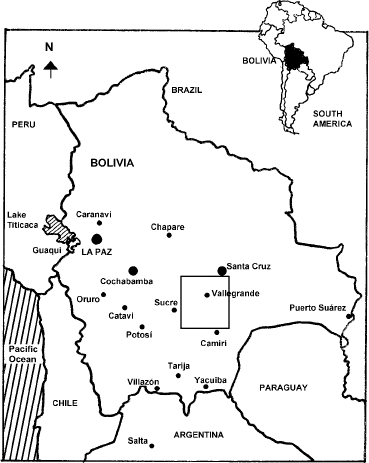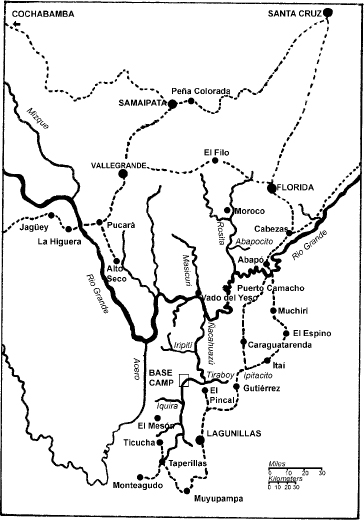The Bolivian Diary (3 page)
Read The Bolivian Diary Online
Authors: Ernesto Che Guevara

August 4, 1967
A deserter leads the Bolivian Army to the guerrilla's main supply cache. Documents discovered there lead to the arrest of key urban contacts.
August 31, 1967
JoaquÃn's detachment, which includes Tania, is ambushed and annihilated while crossing the RÃo Grande at Puerto Mauricio (Vado del Yeso).
September 14, 1967
Loyola Guzmán is arrested along with hundreds of others suspected of collaborating with the guerrilla movement.
September 22, 1967
The guerrillas occupy the town of Alto Seco.
September 26, 1967
The guerrilla unit falls into a Bolivian Army ambush at Quebrada del Batán, near La Higuera.
October 8, 1967
The remaining 17 guerrillas are trapped by army troops and conduct a desperate battle in the Quebrada del Yuro (El Yuro ravine). Che Guevara is seriously wounded and captured.
October 9, 1967
Che Guevara and two other captured guerrillas (Willy and Chino) are murdered by Bolivian soldiers following instructions from the Bolivian government and Washington. The remains of Che Guevara and the other guerrillas are secretly buried in Bolivia.
October 14, 1967
Survivors of the battle of Quebrada del Yuro are ambushed at the fork of the Mizque and RÃo Grande rivers.
October 15, 1967
In a television appearance Fidel Castro confirms news of Che Guevara's death and declares three days of official mourning in Cuba. October 8 is designated the Day of the Heroic Guerrilla.
October 18, 1967
Fidel Castro delivers a memorial speech for Che Guevara in Havana's Revolution Plaza before an audience of almost one million people.
February 22, 1968
Three Cuban survivors (Pombo, Urbano, and Benigno) cross the Bolivian border into Chile, after traveling across the Andes on foot. They succeed in making it back to Cuba. Two Bolivians (Inti and DarÃo) stay in Bolivia and later reorganize the ELN.
Mid-March 1968
Microfilm of the pages of Che's Bolivian diaries arrives in Cuba.
July 1968
Che Guevara's
Bolivian Diary
is published in Cuba and distributed free of charge to the Cuban people. It is simultaneously published in many countries to counter the CIA campaign to discredit the revolutionary movement in Latin America. With an introduction by Fidel Castro, it becomes an instant international bestseller.
July 1997
Che Guevara's remains are finally located and returned to Cuba and buried along with the bodies of other guerrilla fighters found in Bolivia in a new memorial built in Santa Clara.
SHOWING THE ZONE OF GUERRILLA OPERATIONS

ZONE OF GUERRILLA OPERATIONS


Camilo Guevara
Santa Cruz, Bolivia
1967
Almost a year of intense warfare has transpired. Recently, due to a betrayal, Joaquin's group has fallen victim to an ambush in Vado del Yeso [Puerto Mauricio], and the encirclement of Che's troops tightens. They have decided to abandon the area in search of more suitable terrain, where they can more effectively develop the conditions to consolidate the guerrilla movement. It is the afternoon and soldiers are advancing; combat is imminent.
On the last page of the red diary, confiscated by the Bolivian military, is an entry dated October 7, 1967. It is barely possible to decipher the author's difficult handwriting: “The 11-month anniversary of our establishment as a guerrilla force passed in a bucolic mood, with no complications ...” These words in no way read as an epilogue to the heroic saga described in the diary, as there is not the slightest tone of discouragement, pessimism, or defeatism; on the contrary, these words appear to be a beginning, a prologue.
***
October 8âA wounded prisoner is transferred to the tumble-down school at La Higuera, absorbed in his pain and almost unable to breathe. He can barely walk upright; he fights with the weight, accumulating over the past few months, which conspires against his shoulders. He has been weakened by calamity and illness, by the death of friends and compañeros, by the betrayal of some, by the unenviable responsibility he bears for the lives of those near and far away, by a yearning for his loved ones. The burden is equal to the sum of terrestrial forces. Yet his body is still upright and armed with conviction, preparing for another battle.
Later, bound against the adobe wall, waiting for the inevitable verdict, he silently observes the head guards. Some are more arrogant than others, assassins in the premature song of victory, who occasionally try to harass the man they consider their victim. But the respect he inspires and the power of his stony gaze deeply affects and confuses them, blocking any inclination toward cowardice. Nevertheless, they are poised to avenge this guerrilla's audacity in facing, with only 50 armed men, an entire army trained and financed by the empire and its Praetorian rangers.
His captors are faced with a tremendous dilemma. On the one hand, they hold one of the most legendary revolutionaries ever known, who can be paraded as proof of foreign aggression or an international communist plot. On the other hand, they know their captive is tenacious, a righteous man commanding solid arguments, who could transform any court into a public platform, so that any trial might become a dangerous political game with an uncertain outcome.
The National Liberation Army of Bolivia (ELN) has
dramatically announced its presence and carried out multiple actions, almost always successfully, with no effective response from the government. Neither national nor international public opinion is detached from these events: everywhere, a sympathetic atmosphere is developing, despite the fact that the expected mass incorporation of Bolivian peasants into the guerrilla ranks has yet not occurred. News reports emerging in recent days have provided the guerrilla fighters with enormous publicity. This is a very delicate moment and those interested in maintaining the status quo know it will be decisive.
A mood of vengeance abounds among the colorless, ignominious drones, who defend their “causes” with such unsubtle methods. If it is paradoxical to make a jail out of a school, it is simply futile (as well as inept and criminal), to seek to kill ideas with a rifle.
He is concerned about the fate of those who made it out of the battle alive, he wonders ... In the brief moments of silence, struggling against the rope to alleviate the numbness in his arms and legs, he retreats into his memories, to the company of his wife, surrounded by their children, his relatives and closest friends, his Argentina, his Cuba, the world, and Fidel.
Undoubtedly, some will praise themselves or will be congratulated for having brought this “glory” to the Bolivian Army. The capture of Commander Guevara has been pure oxygen for the lifeblood and prestige of the regimeâat least this is what they think. Should they have asked themselves: How can a future spirit be imprisoned in the past? How can an example be incarcerated?
With his leg wounded, his rifle broken, and with no other weapon, they managed to capture this man, but only because
he was a brother to his compañeros, a real man, a true revolutionary to the core, a human being moved only by great feelings of love.
He could have broken through the encirclement of soldiers surrounding him. Who could doubt his tactical genius? But he preferred to remain with those who could not defend themselves, the sick and wounded compañeros. He could have left Santa Cruz some time before, but he decided to wait, to continue the search and not abandon Joaquin's group. Precious time transpired, but he never dwelled on these lost days. He could have allowed Pelao and the Frenchman, who later demonized him, to attempt to reach the city through their own efforts, but he preferred to leave them where they were reasonably safe.
Such an intense, complete man does not fit within the narrow criteria of those who pass judgment on him. Certainly, there are those who fear him and criticize himâunwavering revolutionaries of after-dinner conversations, bureaucrats, ubiquitous cowards, opportunists, tyrants of the oligarchies and oligarchs of democracy. For different reasons they hide from him or try to hide him away behind the illusory mantel that utopias are unattainable. But others respect himâthe majorities that in part or in full share his vision of the future. His grandeur is barely perceptible at the time of his capture, history will define it later.
Close by, during the evening hours, a small group of men have gathered in an area hemmed in by abrupt mountainous terrain. Some have fresh wounds, all are starving, thirsty, and exhausted beyond words, uncertainty etched on their faces. They desperately seek news on the whereabouts of their
compañeros and their beloved commander via a portable radio. Taunted by a powerful intuition of disaster, they nervously move the dial in search of the more reliable radio stations, although naturally they regard any broadcast with tremendous reservation. They know from experience that radio news can be subtly manipulated, capitalizing on the guerrilla fighter's perennial need for information by laying mortal traps or by leading them in mistaken directions. This time, however, they are willing to resign themselves to the most elementary indication, and will act without measuring the consequences.
They will do whatever is necessary, in accordance with their ideas and their feelings of solidarity toward their brothers-in-arms. The desire to help them and to save the movement is stronger than any rational hesitation about a rescue mission. What is at stake is the ELN itself, in this initial formative stage, for which the fighters have already so often wagered their lives.
The possible evacuation of the guerrilla forces had been planned, including where they would meet in the event of a setback or forced retreat: if not here, there, and if not, farther over. They have fully complied with the previously agreed on plans. There is no reason to feel shame, but after so many months of fighting in Bolivian territory, some feel vulnerable, with an unjustified yet understandable sense of guilt. For others, it has been an entire lifetime of sharing the ups and downs of the struggle, the few provisions, and the many hopes, dreams, and fearsâof surviving others, of risking one's life, of losing beloved friends and relatives. They feel the anguish and regret of a latent despair, silently wishing for the same fate as their compañeros, whatever that might be, and although they force
optimism to remain uppermost in their minds, their hearts experience the shocking acknowledgment of what they had until now considered impossible.
The dramatic news is confirmed: Che has died in combat. His belongings are described in vivid detail and other information is given that only those close to the scene could have known. The reality engulfs them, overpowering their thoughts and the fiber of their bodies. What should they do? What is to be done? What are they doing there? Time presses upon them. The army has not abandoned its search for the guerrillas; in minutes or seconds, the soldiers might fall upon them. They have to act immediately. How many memories flood their minds, how many voices are still fresh in their ears? A phrase comes to mind, one of those that reduces great truths to a few words: “In a revolution, if it's a true revolution, you win or you die.”
